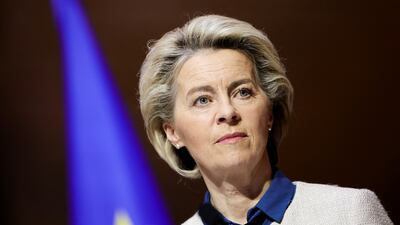Live updates: follow the latest news on Russia-Ukraine
Britain and the European Union announced further sanctions on Russia on Tuesday which ban the export of luxury goods and expand the list of oligarchs being punished over Moscow's invasion of Ukraine.
Iron and steel are among the goods covered by new trade restrictions, while Britain hiked tariffs on Russian artworks, beverages and fur skins and announced export bans covering luxury vehicles and high-end fashion.
Both powers announced they were stripping Russia and Belarus of a favoured nation status at the World Trade Organisation, a step which hinders their access to European markets.
Britain said it was sanctioning 370 more people including prominent faces such as Kremlin spokesman Dmitry Peskov, former head of state Dmitry Medvevev and other close allies of President Vladimir Putin.
"We are going further and faster than ever in hitting those closest to Putin" including by sanctioning "propagandists who peddle his lies and disinformation," said UK Foreign Secretary Liz Truss.
Chancellor of the Exchequer Rishi Sunak said the restrictions would "further isolate the Russian economy from global trade, ensuring it does not benefit from the rules-based international system it does not respect".
"These tariffs build on the UK’s existing work to starve Russia’s access to international finance, sanction Putin’s cronies and exert maximum economic pressure on his regime," Mr Sunak said.
The EU's package also bans credit rating agencies from providing services to Russian clients, in a move which the European Commission said would further cut off Russia from financial markets.
It bans new investments in the Russian energy sector and sanctions what Brussels said were key companies in the aviation, military and dual use, shipbuilding and machine building sectors.
The EU's sanctions package is the fourth since Russia invaded Ukraine. Belarus has been brought under the sanctions umbrella because some Russian troops entered Ukraine from its territory.
France, which holds the EU presidency, said the bloc “in consultation with our international partners, has approved a fourth package of sanctions targeting individuals and entities involved in the aggression against Ukraine, as well as several sectors of the Russian economy”.
The announcements were in line with what leaders had announced at the Versailles summit last Friday, that a stringent package of sanctions would be introduced if Russia continued its invasion of Ukraine.
Since the war started last month, the EU has adopted tough measures against Russian President Vladimir Putin, Russia’s financial system and its oligarchs.
Last week, the bloc’s nations agreed to impose further sanctions on 160 people and added restrictions on the export of maritime navigation and radio communications technology.
EU Commission President Ursula von der Leyen said the fourth package of sanctions would further isolate Russia “and drain the resources it uses to finance this barbaric war”.
Ms von der Leyen said the EU would work in collaboration with Group of Seven countries to increase the pressure against Moscow.
Efforts to agree on an oil boycott against Russia are complicated, because some EU countries, including Germany and Italy, are much more dependent on Russian energy.
Poland, for example, receives 67 per cent of its oil from Russia while Ireland receives only 5 per cent.










































